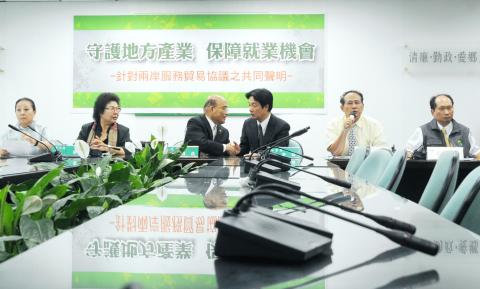The Democratic Progressive Party (DPP) yesterday said it would set up two lines of defense against the opaque and unfair cross-strait service trade agreement, at the legislature and at local government level.
“The legislature, after a negotiation, has said that it will screen and vote on the pact clause by clause. If the Chinese Nationalist Party (KMT) pushes the pact through the legislature, local governments can take administrative measures to counter the agreement,” DPP Chairman Su Tseng-chang (蘇貞昌) said after the party’s weekly Central Standing Committee (CSC) meeting, which leaders of five of the six DPP-governed cities and counties attended.
Kaohsiung Mayor Chen Chu (陳菊), Tainan Mayor William Lai (賴清德), Pingtung County Commissioner Tsao Chi-hung (曹啟鴻), Chiayi County Commissioner Helen Chang (張花冠) and Yilan County Deputy Commissioner Wu Tze-cheng (吳澤成) attended the meeting.

Photo: Wang Yi-sung, Taipei Times
The DPP supports free trade, but it is strongly opposed to the way the administration of President Ma Ying-jeou (馬英九) handled the negotiations, Su said.
There was a lack of transparency, a failure to keep the affected sectors informed and the negotiations were conducted without a comprehensive assessment of the potential impact on Taiwan’s economy, in particular small and medium-sized enterprises and the job market, Su said.
The 64 sectors the government proposes to open to Chinese investment could involve more than 1,000 sub-sectors, harming small businesses and vendors the most, DPP spokesperson Lin Chun-hsien (林俊憲) said.
A CSC resolution reached yesterday demanded that lawmakers across party lines strictly monitor the pact and that the central government submit an impact assessment report as soon as possible, Lin said, adding that if the KMT tries to forcibly push the pact through the legislature, the DPP would not rule out countermeasures, including a massive demonstration, because the potential adverse impact on local businesses would be huge.
Greater Kaohsiung is likely to suffer tremendous damage from the pact as the city accounts for 12.13 percent of companies in the service sector and 8.92 percent of the sector’s annual revenue, Chen told a press conference held after the CSC meeting.
“Up to 4 million workers in the sector across the country could be impacted by the agreement. I call on every lawmaker to view people’s livelihoods as the priority when he or she reviews the agreement,” Chen Chu said.
Lai described Ma’s decision to sign the service trade agreement as “unwise” at a time when the Economic Cooperation Framework Agreement (ECFA), which was signed in 2010, has failed to live up to the president’s pledge that it would benefit the nation’s economy.
“The worst thing was that the government neither made negotiations transparent, nor consulted the related sectors, nor formulated any supporting measures to minimize the negative impact,” Lai said.
Wu said 62.1 percent of the service sector workers in Yilan County could be affected by the agreement, which was why the pact has caused panic among residents of the county.
The grouper breeding sector in Pingtung and the tourism industry in Chiayi County were supposed to blossom after the signing of the ECFA, according to Ma, but both sectors have suffered from destructive competition from Chinese investment backed by state-run companies and government subsidies, Tsao and Chang said.

The Mainland Affairs Council (MAC) today condemned the Chinese Communist Party (CCP) after the Czech officials confirmed that Chinese agents had surveilled Vice President Hsiao Bi-khim (蕭美琴) during her visit to Prague in March last year. Czech Military Intelligence director Petr Bartovsky yesterday said that Chinese operatives had attempted to create the conditions to carry out a demonstrative incident involving Hsiao, going as far as to plan a collision with her car. Hsiao was vice president-elect at the time. The MAC said that it has requested an explanation and demanded a public apology from Beijing. The CCP has repeatedly ignored the desires

Many Chinese spouses required to submit proof of having renounced their Chinese household registration have either completed the process or provided affidavits ahead of the June 30 deadline, the Mainland Affairs Council (MAC) said on Thursday. Of the 12,146 people required to submit the proof, 5,534 had done so as of Wednesday, MAC deputy head and spokesperson Liang Wen-chieh (梁文傑) said. Another 2,572 people who met conditions for exemption or deferral from submitting proof of deregistration — such as those with serious illnesses or injuries — have submitted affidavits instead, he said. “As long as individuals are willing to cooperate with the legal

The Ma-anshan Nuclear Power Plant’s license has expired and it cannot simply be restarted, the Executive Yuan said today, ahead of national debates on the nuclear power referendum. The No. 2 reactor at the Ma-anshan Nuclear Power Plant in Pingtung County was disconnected from the nation’s power grid and completely shut down on May 17, the day its license expired. The government would prioritize people’s safety and conduct necessary evaluations and checks if there is a need to extend the service life of the reactor, Executive Yuan spokeswoman Michelle Lee (李慧芝) told a news conference. Lee said that the referendum would read: “Do

Taiwan's Vice President Hsiao Bi-khim (蕭美琴) said Saturday that she would not be intimidated by the Chinese Communist Party (CCP), following reports that Chinese agents planned to ram her car during a visit to the Czech Republic last year. "I had a great visit to Prague & thank the Czech authorities for their hospitality & ensuring my safety," Hsiao said on social media platform X. "The CCP's unlawful activities will NOT intimidate me from voicing Taiwan's interests in the international community," she wrote. Hsiao visited the Czech Republic on March 18 last year as vice president-elect and met with Czech Senate leadership, including